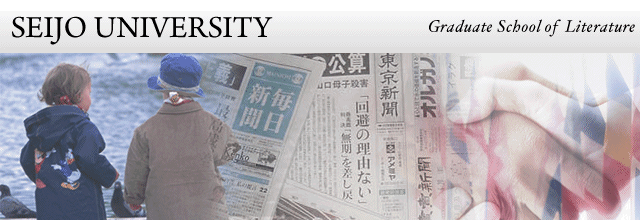Department of Communication Studies
Curriculum and its features
The Department of Communication Studies aims at social research into the phenomena of human communication and mass communication in society, based mainly on the theories and methods of sociology, psychology and social psychology. It also aims at MA and Ph.D.-level education in this field.
Communication is, in short, the process of making connections between humans. Mediated connections via newspapers or television are called “mass communication,” or “mass media.” The Kawara-ban (a wood-printed newspaper in Edo era) is sometimes said to have been the first mass medium in Japan. What we mean here by “mass” is the group of people liberated from feudal society's restrictive social settings, in which case the ordinary people of the Edo period Japan may not be fully and legitimately described as a “mass public.”
Studies into history and the effects of mass media have been carried out in fields such as modern history, sociology and social psychology. Culture in mass society is known as “mass culture” or “popular culture,” and its development is deeply connected to that of the mass media. Advertising is also an old social phenomenon, which appeared along with the advent of mass media themselves.
People often connect with each other, without any intervening mass medium, but rather through personal media of various kinds. This type of interpersonal communication may now occur more frequently in society: direct face to face conversations, interchanges through telephone calls or letters, and e-mails in recent years. All this interpersonal communication is carried out using some sort of language.
Despite being rather new as academic disciplines, social psychology, sociology and psychology have advanced many valuable findings and knowledge about instances of interpersonal communication, such as persuasion, interpersonal attraction, rumors, and mutual understanding.
The Department of Communication Studies provides a wide range of courses ranging from basic knowledge to the latest research in the field of mass communication and human communication. Special emphasis is placed on instruction and learning of actual social research and composition of academic paper based on the research results, both of which are regarded as vital skills for future social researchers.
In the first two years of this department, graduate students are expected to complete their MA theses based on their own originally collected empirical data. In the latter three years, students continue their own research, which will hopefully lead to the completions of their Ph.D. dissertations.



